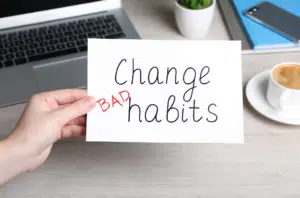The lies we tell ourselves.
Take this example: You’ve had music playing in the background while working on something. Then, a song “randomly” pops into your head in the hours/days following. It was not random at all! Your mind subconsciously processed what you were listening to and something you were doing triggered it to be recalled. Now, if you think about all the thoughts your mind is subconsciously processing, how many would be in your favor?
Over the years, I have
heard it all. People have all kinds of reasons for why things cannot change, why things need to change, why they are not happy, and what it will take to be happy. I am going to focus on the three most prevalent myths my clients share:
- More money means more happiness.
- In order to make it, I have to grind.
- I don’t have time to sleep, exercise, and/or eat healthy.
Sound familiar?
We have been inundated with messages of success and happiness our entire lives. Clever marketing schemes make you feel like you have to keep searching for more, doing more, and being more in order to achieve happiness and success.
This is bullsh*t!
Ensuring that your mind, body, and spirit are properly nourished is the foundation of anything you will do. It’s time to learn how to
prioritize yourself and your health to be successful, rather than
sacrificing it!
Wealth
Myth: More money means more happiness.
Let’s be honest, when you think about work, is it connected to money? What if it was about so much more?
- Passion
- Purpose
- Freedom to enjoy life
Let me give you an example: Jamie told me that they were going after a promotion that would offer a salary increase of $30,000. On the surface, this was great news! I mean, who doesn’t want an additional $30,000? Well, when Jamie and I explored this more, they were able to identify just how much this would actually cost them – additional hours, less vacation time, more stress, and a lot of time on the road. The entire reason Jamie indicated they wanted this promotion was to be able to use the additional income to travel but they would have less opportunities to do so. Ultimately, Jamie decided more money would not lead to increased happiness in this situation.
Happiness is fleeting and that is how it is meant to be!
Instead of savoring happiness when it is present, we often quickly shift to whatever is next and this leads to a never-ending cycle of
chasing but never cherishing.
Maybe it is not money that you are after, but something else – titles, material possessions, relationships. While I think it is important that we strive to achieve, it is a dangerous game to think that happiness can be gotten and kept through a role, accomplishment, etc.
Research has shown that we naturally pay more attention to the negative experiences in our lives rather than the positive ones. This contributes to feeling unhappy in that we are less likely to notice!
What lie(s) have you been telling yourself about how money will improve your happiness? How can you focus on what brings you happiness now…and continue to pursue opportunities in your life?
Self
Myth: In order to make it, I have to grind.
While many people are starting to realize the importance of balancing their professional and personal lives, many have no idea how. Essentially, the idea of work-life balance is highly sought after, but often believed to be impossible. We live in a hustle-and-grind culture that celebrates hard work, but what if it could be different?
Work smarter, not harder.
Very rarely is more time actually needed. Instead, prioritization and efficiency are key. Here are a few very basic, but necessary, ways to be more efficient with your time:
1. Focus on one task at a time rather than bouncing between different things.
You may have convinced yourself that you can multitask but that is a lie. Our brains operate best when focused on one task. Be sure to block off time to focus on just that one thing and then you can build in breaks or opportunities to check your emails, messages, etc.
2. Have an agenda of what needs to be completed and make a plan for ensuring it gets done.
All too often, my clients will come to me saying, “I make to-do lists but there is just never enough time in the day to get everything done.” To this, I ask:
- Was the to-do list realistic? That is, did you have enough items to reasonably complete in a day?
- Were you clear on what needed to be done versus what you wanted to get done?
- Was time blocked in your calendar to complete the task(s)?
3. Assess what you are saying yes to.
Before saying yes to whatever you are being asked to complete, pause and assess:
- Do I have the time to commit?
- Is this something I should be taking on?
- Could this be delegated elsewhere?
Are you among the many who no longer want to work your life away hoping to someday enjoy it? What change do you commit to making today to end the hustle-and-grind mentality?
Health
Myth: I don’t have time to sleep, exercise, or eat healthy.
One of the biggest challenges reported by clients is “not having enough time”. Most commonly, basic needs such as exercising, eating right, and getting enough sleep are the first things to go. The short- and long-term health risks can be dangerous.
This myth is directly connected to the previous one that highlights the focus on
hustle over health. Just as many struggle to understand how being more efficient leads to better results, few focus on prioritizing their health over career. However, the key is to learn how to use your health to boost your success!
Build a solid foundation for success

To achieve all you are capable of, you must start at the bottom. Tending to your basic needs will provide you the foundation for a successful personal and professional life. Here are a few questions to consider:
1. Am I getting enough sleep every night?
“Enough” varies for each of us. According to the
National Sleep Foundation guidelines1 healthy adults generally need between 7 and 9 hours of sleep per night. Ensuring you allow your body the time it needs to recharge will lead to optimal brain functioning, which improves productivity, concentration, and a slew of mental health benefits.
2. What foods help keep me satiated?
During times of stress, we naturally gravitate toward sweet or fatty foods. However, these do not help our brains function optimally and often leave you craving more. According to
research, foods with antioxidants – fruits, vegetables, green tea, and coffee – help protect your brain from damage.
2
3. How much movement do I need to feel my best?
There are many forms of movement – running, exercising at the gym, yoga, etc. It is important for you to try different things to learn which feels best for your body. Commonly, we need different types of movement depending on various factors so having a few to choose from is best. To help clarify which movement is right for you, first assess the need:
- Do you need to exert energy (i.e., get your heart pounding)?
- Are you trying to ease physical tension?
Careful consideration of these questions can help decide which action is best based on your present needs. Then, continue to notice how your mind and body are responding to what you are doing. Modify as needed.
Are you one of the many who continues to ignore the flashing engine light warning of the impending danger? What action will you take to ensure your basic needs are met every day?
Ready to defeat the lies?
The first step to overcoming these lies is recognizing them. Take time to notice what your thoughts are and how they may be fueling some of your unhealthy habits. Thoughts control behavior but they can be changed. There is a connection between these myths: the pursuit of money leads to a grind mentality, which impacts personal health. At Ancorio, we focus on how to prioritize your personal life and health to achieve professional success. Both are possible!
Resources:
1.
National Sleep Foundation guidelines
2.
11 Best Foods to Boost Your Brain and Memory









